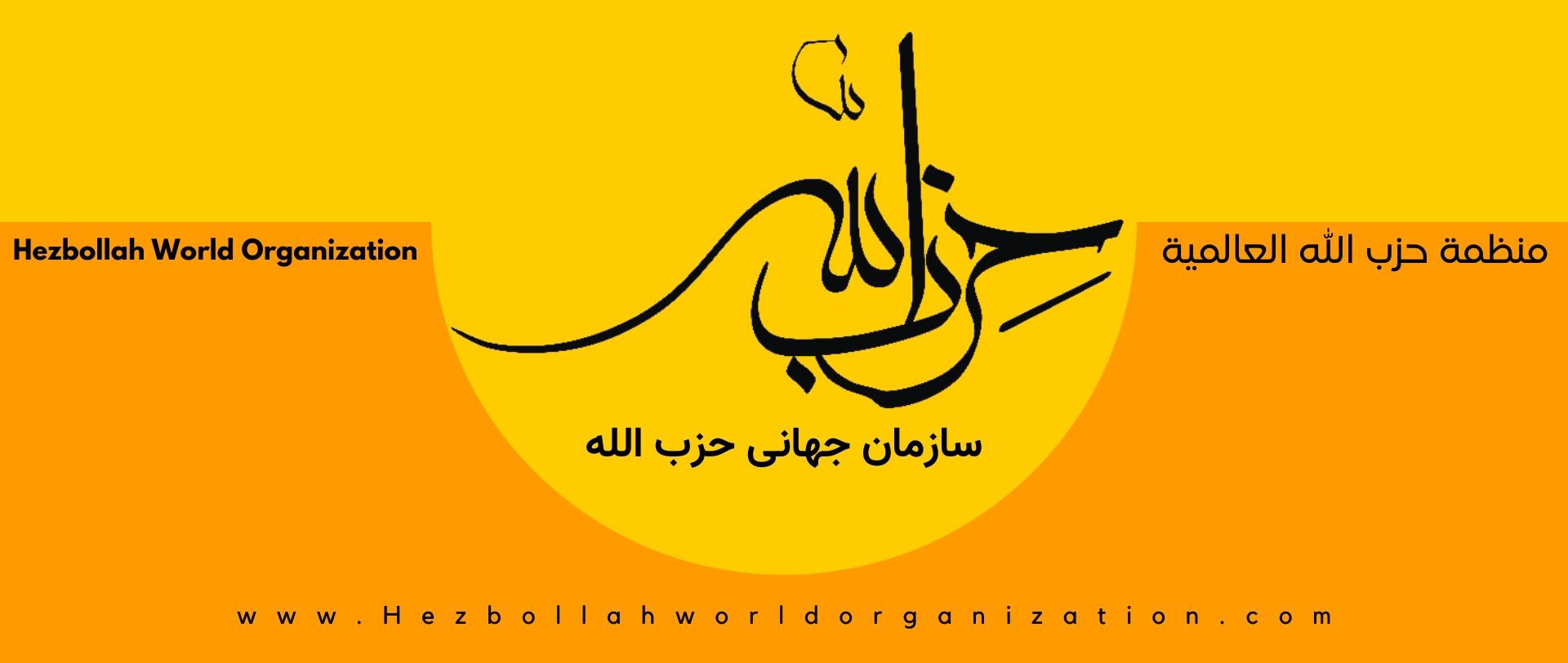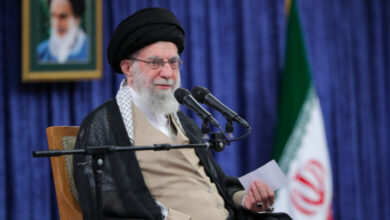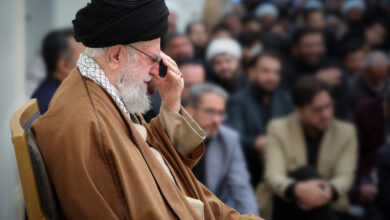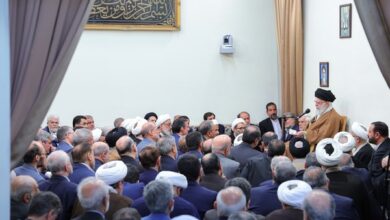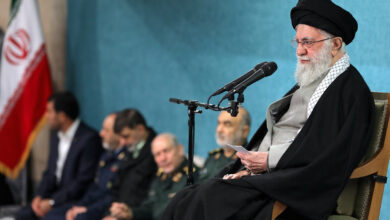The Charter of Quranic Recitations
Statements by the Leader in the Gathering of Familiarity with the Quran

The Charter of Quranic Recitations [1]
Preliminary Principles
1: Principle of Necessarily “Describing” Quranic gatherings as beautiful and sweet visual and auditory experiences of the Quran and Quranic people. [2]
2: Principle of Necessarily offering “Praise” and “Thanks” to God for the increase in Quran readers during the current era of the Revolution. [3]
3: Principle of Quranic reciters Benefiting from various “Methods,” considering different “Age Groups.” [4]
4: Principle of the Necessity of Remembering “Good” from the “Chain” of internal Quranic reciters from the past to the present for appreciation. [5] Of:
a: Their past efforts
b: Encouraging young Quranic recitation followers to benefit from the styles and voices of past reciters.
c: Creating and continuing a chain of reciters across different generations.
d: Preserving the recitation methods of past reciters.5: Principle of the Month of Ramadan being a celebration for Quran reciters. [6]
6: Principle of the Necessity of Paying Attention to Meaning and Contemplating when reciting the Quran. [7]
7: Principle of Necessarily Observing the Etiquette of Recitation when reciting the Quran. [8]
8: Principle of the Necessity of Recitation’s influence on creating and increasing Humility and Divine Remembrance. [9]
9: Principle of the Necessity of Expanding Quranic Literacy in Society. [10]
10: Principle of the Absolute Role of the Media in Spreading Quranic Culture. [11]
11: Principle of the Necessity of Countering Spiritual and Cultural Threats through the Quran. [12]
12: Principle of the Necessity of Giving Identity to the Islamic Society through the Quran. [13]
13: Principle of the Necessity of Translating and Understanding the Meanings of the Quran. [14]
14: Principle of Developing Quranic Programs in the Educational and Cultural System. [15]
Authenticities and Principles
First Authenticity: The Authenticity of the Necessity of Quenching Thirst from the Never-Ending Springs of the Quran. [16]
1: Principle of Familiarity with the Quran and its Impact on Society. [17]
2: Principle of the Quran’s Role in Solving Individual, Emotional, and Communicational Problems of Society, and Repelling and Removing Afflictions. [18]
Second Authenticity: The Authenticity of the Quran being a Guide in:
a: Increasing Spiritual Motivation and Correcting Thought and Action
b: Repelling and Removing Problems and Afflictions. [19]
c: How to Cooperate with Nations. [20]
d: How and in what order to Deal with the Powerful. [21]1: Principle of the Quran’s Role in Increasing Spiritual Motivation and Correcting Thought and Action. [22]
2: Principle of the Text-Centered Nature of the Quran and Hadith for Curing Moral and Immoral Diseases. [23]
3: Principle of the Quran’s Role in Repelling and Removing Individual, Communicational, and Emotional Problems of Society and Repelling and Removing Afflictions. [24]
4: Principle of the Text-Centered Nature of the Quran for Understanding and Implementing Justice in Islamic Society. [25]
[1]. This entire discussion has been compiled solely based on the statements of the Supreme Leader on the first of Ramadan in the year 1446 AH.
[2]. “I thank Almighty God for the re-establishment of this meeting and the sweet and beautiful visual and auditory experience that this meeting has for this humble servant” (taken from the statements of the Supreme Leader in the Gathering of Familiarity with the Holy Quran – Ramadan 1446).
[3]. “I also praise God, I thank Almighty God for the continuous increase in Quran readers. Our eyes, our ears were delighted” (taken from the statements of the Supreme Leader in the Gathering of Familiarity with the Holy Quran – Ramadan 1446).
[4]. “We truly enjoyed the recitations that took place and from different cities, in different ages, with different methods, and all were Quranic and all were reciters” (taken from the statements of the Supreme Leader in the Gathering of Familiarity with the Holy Quran – Ramadan 1446).
[5]. “I was also very happy to see Mr. Rouhaninejad. After forty-something years, we heard his voice again. He had a wonderful voice. At that time, in his youth, in those years, may God have mercy on the late Mr. Mokhtari, who was a student of Mr. Mokhtari and that amazing voice” (taken from the statements of the Supreme Leader in the Gathering of Familiarity with the Holy Quran – Ramadan 1446).
[6]. “Praise be to God, I congratulate you on the arrival of the blessed month of Ramadan, which is truly a great celebration for believers and appreciators. We ask Almighty God to make this Ramadan a real celebration and a blessing for all the people of Iran and all of you” (taken from the statements of the Supreme Leader in the Gathering of Familiarity with the Holy Quran – Ramadan 1446).
[7]. Recitation of the Quran should be accompanied by understanding and contemplation so that its real impact is evident in the individual and society.
[8]. When reciting the Quran, one must understand the presence in the divine presence and read the verses with attention to the meaning.
[9]. Correct recitation of the Quran leads to heartfelt humility and remembrance of God in society.
[10]. Recitation of the Quran should be in such a way that Quranic teachings become general concepts and social beliefs.
[11]. Radio and television and other media should support and promote outstanding Quranic productions in society.
[12]. The Quran is the best tool to combat the soft and propaganda threats of the enemies.
[13]. The Quran strengthens Islamic and national identity in Muslim societies.
[14]. Islamic society must pay special attention to understanding the meanings of the Quran so that its effects are evident in life.
[15]. Various institutions, including education, seminaries, and the media, should strive to strengthen Quranic culture.
[16]. “What is important in my opinion is that we can quench the thirst of our society, our own society in the first place, from the never-ending spring of the Quran” (taken from the statements of the Supreme Leader in the Gathering of Familiarity with the Holy Quran – Ramadan 1446).
[17]. Recitation, understanding, and acting upon the Quran leads society towards moral and social reform.
[18]. The Quran provides solutions to all individual, moral, social, and international problems.
[19]. “We need this, we desperately need it, both in our individual lives, our personal lives, our morals, our behavior, our conduct, there are flaws that can be corrected with the Quran, and in our collective lives, where collective life is a part of the communication within society; our communication with each other, our cooperation, our interaction, our mutual affections. A part of it is also related to confronting outside of society. These are our issues. In all of these, both in personal issues, in social issues within society, and in social issues related to outside of society, in all of these we have afflictions that can be overcome with the Quran. The Quran can guide us in this field and take our hand” (taken from the statements of the Supreme Leader in the Gathering of Familiarity with the Holy Quran – Ramadan 1446).
[20]. “Today, in the field of communication with the outside of society, the Iranian nation is facing a vast front of disbelieving or hypocritical power holders. We have no problem with nations, nations are either brothers with each other, or if they are strangers, they have nothing to do with each other” (taken from the statements of the Supreme Leader in the Gathering of Familiarity with the Holy Quran – Ramadan 1446).
[21]. “The one who deals with the affairs of countries and nations are the powerful. Today, we are among the countries that are facing a vast front of these powerful individuals. How should we deal with them? The Quran contains how to deal with them, at what stage should we talk to them, at what stage should we offer a hand of cooperation, at what stage should we punch them in the mouth, at what stage should we draw our swords, all of this is clear” (taken from the statements of the Supreme Leader in the Gathering of Familiarity with the Holy Quran – Ramadan 1446).
[22]. In addition to providing practical solutions, the Quran creates the motivation for contemplation and spiritual growth in the individual.
[23]. Selfishness, avarice, envy, suspicion, laziness, and lust, and other moral diseases are cured by reciting and acting upon the Quran. “The solution is in the Quran, in the field of our personal affairs, our personal conditions, we are afflicted with moral and spiritual diseases. Everyone, not just us, all of humanity today is afflicted with these spiritual, moral, and spiritual diseases, they are afflicted with envy, they are afflicted with avarice, they are afflicted with suspicion, they are afflicted with laziness, they are afflicted with lust, they are afflicted with selfishness, they are afflicted with preferring their own interests over the interests of the collective. These are them, these are also among us, we are also an Islamic society, we have made progress in some places, but at the same time we also have these diseases” (taken from the statements of the Supreme Leader in the Gathering of Familiarity with the Holy Quran – Ramadan 1446).
[24]. The Quran provides solutions to all individual, moral, social, and international problems.
[25]. After monotheism, the most important principle in Islamic society is justice, which is emphasized in the Quran. “In the Quran, in the field of social issues within society, the issues of communication, well, you know that from the perspective of Islam, in the formation of Islamic society after monotheism and teachings and communication with God, the most important issue is justice, social justice. The prophets have not called for anything as much as justice after monotheism. We have problems in the field of social justice” (taken from the statements of the Supreme Leader in the Gathering of Familiarity with the Holy Quran – Ramadan 1446).
To receive the complete article, please refer to the products section.
